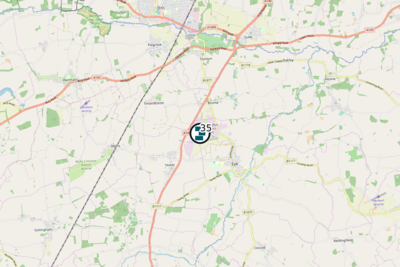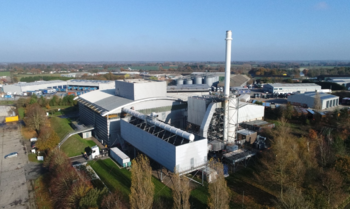Eye Power Station: Difference between revisions
m Bin52 moved page EPR Eye Ltd to Eye Power Station: update database |
No edit summary |
||
| (3 intermediate revisions by the same user not shown) | |||
| Line 1: | Line 1: | ||
A [[Biomass Waste EFW]] facility [[Eye Power Station]] is focused on processing up to 140,000 tonnes per annum of [[Agricultural Waste|Poultry Litter]] but is capable of co-firing other [[Biomass]], including a high proportion of [[Wood Waste]] in recent years, to generate up to 17MWe. | |||
[[Category:Biomass EfW Plants]]{{#vardefine: epr|BP3635LA}} | [[Category:Biomass EfW Plants]]{{#vardefine: epr|BP3635LA}} | ||
{{BiomassPlant|NAME= | {{BiomassPlant|NAME=Eye Power Station|id=35|EPR={{#var: epr}}}} | ||
[[File:Eye Power Station.png|350px|left|Eye Power Station, picture from annual report, all rights reserved EPR]]__TOC__ | [[File:Eye Power Station.png|350px|left|Eye Power Station, picture from annual report, all rights reserved EPR]]__TOC__ | ||
<br clear='left'/> | <br clear='left'/> | ||
==Summary== | ==Summary== | ||
A [[Biomass Waste EFW]] facility [[Eye Power Station]] is focused on processing up to 140,000 tonnes per annum of [[Agricultural Waste|Poultry Litter]] but is capable of co-firing other [[Biomass]], including a high proportion of [[Wood Waste]] in recent years, to generate up to 17MWe. The owner, [[Melton Renewable Energy Ltd]] claims that this plant is the first [[Agricultural Waste|Poultry Litter]] fuelled power station in the world and has been generating power since 1992 i.e. for over 20 years<ref>https://www.mreuk.com/eye</ref>. | |||
==Plant== | ==Plant== | ||
Built and commissioned in 1992, the plant was converted with assistance from [[K.E.M]] in 2017 to add fuel flexibility to enable it to receive [[Wood Waste]]. The conversion comprised fuel feeding, combustion grate system and slag transport system - the boiler supplies 58tonnes/hour of steam at 66 bar(g) and 450<sup>o</sup> to a steam turbine for power production<ref>[https://www.kem.dk/cases/eye-power-station-uk/ KEM Website]</ref>. | |||
== | {{BioSustain|EPR={{#var: epr}}}} | ||
{{EAIn|EPR={{#var: epr}}}} | |||
==References== | ==References== | ||
<references/> | <references /> | ||
Latest revision as of 07:13, 15 August 2022
A Biomass Waste EFW facility Eye Power Station is focused on processing up to 140,000 tonnes per annum of Poultry Litter but is capable of co-firing other Biomass, including a high proportion of Wood Waste in recent years, to generate up to 17MWe.
| Eye Power Station Operational | |
 See Biomass EfW → page for a larger UK Wide map. | |
| Operator | Melton Renewable Energy Ltd (MRE) |
| Capacity | 16.5 MWe |
| Feedstock | Waste Wood/Poultry Litter |
| EPR (Waste Licence) | BP3635LA |
| ROC | Yes |
| CfD | |
| CHP | Unkwn |
Operators Annual Report
Input Data
| Year | Wood | Litter | RDF | Other | Total |
|---|---|---|---|---|---|
| 2018 | 53310 | 67470 | 0 | 1862 | 122642 |
| 2019 | 49580 | 82443 | 0 | 1998 | 134021 |
| 2020 | 38848 | 95463 | 0 | 1390 | 135701 |
| 2021 | 50627 | 78901 | 0 | 1301 | 130829 |
| 2022 | 44478 | 73441 | 0 | 1380 | 119299 |
Output Data
| Year | IBA | IBA %ge of Tot IN | APC | APC %ge of Tot IN |
|---|---|---|---|---|
| 2018 | 3243 | 2.64% | 3605 | 2.94% |
| 2019 | 3829 | 2.86% | 4380 | 3.27% |
| 2020 | 4705 | 3.47% | 6003 | 4.42% |
| 2021 | 2824 | 2.16% | 5948 | 4.55% |
| 2022 | 3284 | 2.75% | 4714 | 3.95% |

Summary
A Biomass Waste EFW facility Eye Power Station is focused on processing up to 140,000 tonnes per annum of Poultry Litter but is capable of co-firing other Biomass, including a high proportion of Wood Waste in recent years, to generate up to 17MWe. The owner, Melton Renewable Energy Ltd claims that this plant is the first Poultry Litter fuelled power station in the world and has been generating power since 1992 i.e. for over 20 years[1].
Plant
Built and commissioned in 1992, the plant was converted with assistance from K.E.M in 2017 to add fuel flexibility to enable it to receive Wood Waste. The conversion comprised fuel feeding, combustion grate system and slag transport system - the boiler supplies 58tonnes/hour of steam at 66 bar(g) and 450o to a steam turbine for power production[2].
Annual Sustainability Tonnage Input/Fuel
The tonnage[3] received by the plant in the most recent Annual Sustainability Report and for the previous 3 years for 2020/21 was reported by Ofgem as below[4]:
| Year | Waste Wood (m3) | Waste Wood (t) | Straw | Miscanthus | Arboricultrual Waste | Sawmill Residue | Foresrty Residue | Round Wood | Short Rotation Coppice | MBM | Other Material |
|---|---|---|---|---|---|---|---|---|---|---|---|
| 2020/21 | 0 | 40896 | 0 | 0 | 345 | 0 | 0 | 0 | 0 | 1655 | 91451 |
| 2019/20 | 0 | 46932 | 0 | 0 | 881 | 0 | 0 | 0 | 0 | 0 | 89324 |
| 2018/19 | 0 | 52503 | 0 | 0 | 0 | 0 | 0 | 0 | 0 | 0 | 75388 |
| 2017/18 | 0 | 0 | 0 | 0 | 0 | 0 | 0 | 0 | 0 | 0 | 0 |
Waste Tonnage, By Origin
The table shows a list of the Waste for the Permit BP3635LA, that has arrived into sites as reported to the Regulator and then publicised in their reported statistics. The Data was last updated on Oct-24. The total reported tonnage arriving at the site was: 134,353t.
Where this tonnage exceeds that reported in year of the corresponding annual report, this may be due to the following reasons:
- Tonnage may have been received but not incinerated, i.e. the material is held pending incineration (the operator return to the EA reports as received whereas the annual report focuses on when the waste is incinerated.)
- Material may have been received into the site but treated in some other way than incineration.
- Material may have been received on the but transferred out of site for disposal/treatment at another site rather than incineration on the site.
| EWC Code | Origin of Waste | Tonnes In |
|---|---|---|
| 02 01 06 | Suffolk | 83143 |
| 02 01 07 | Suffolk | 1246 |
| 02 01 99 | Suffolk | 104 |
| 02 02 03 | Warwick | 23 |
| 02 03 99 | Suffolk | 1173 |
| 19 12 07 | Suffolk | 47326 |
| 20 03 99 | Suffolk | 1338 |
References
- ↑ https://www.mreuk.com/eye
- ↑ KEM Website
- ↑ In the case of EfW plants with gasification technology the figures are reported in terms of cubic metres of syngas produced rather than tonnes used
- ↑ Biomass Sustainability Dataset 2020-21
